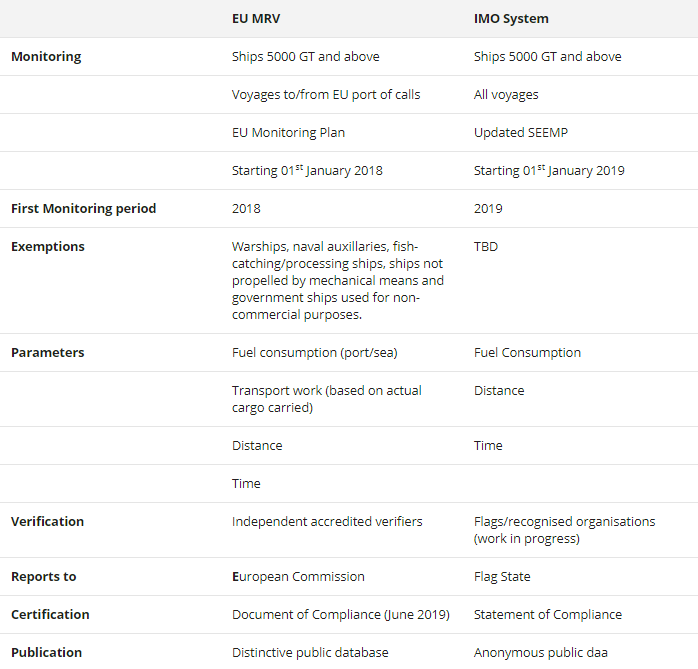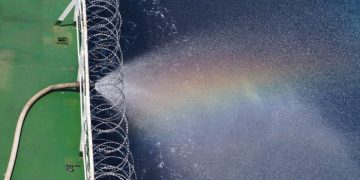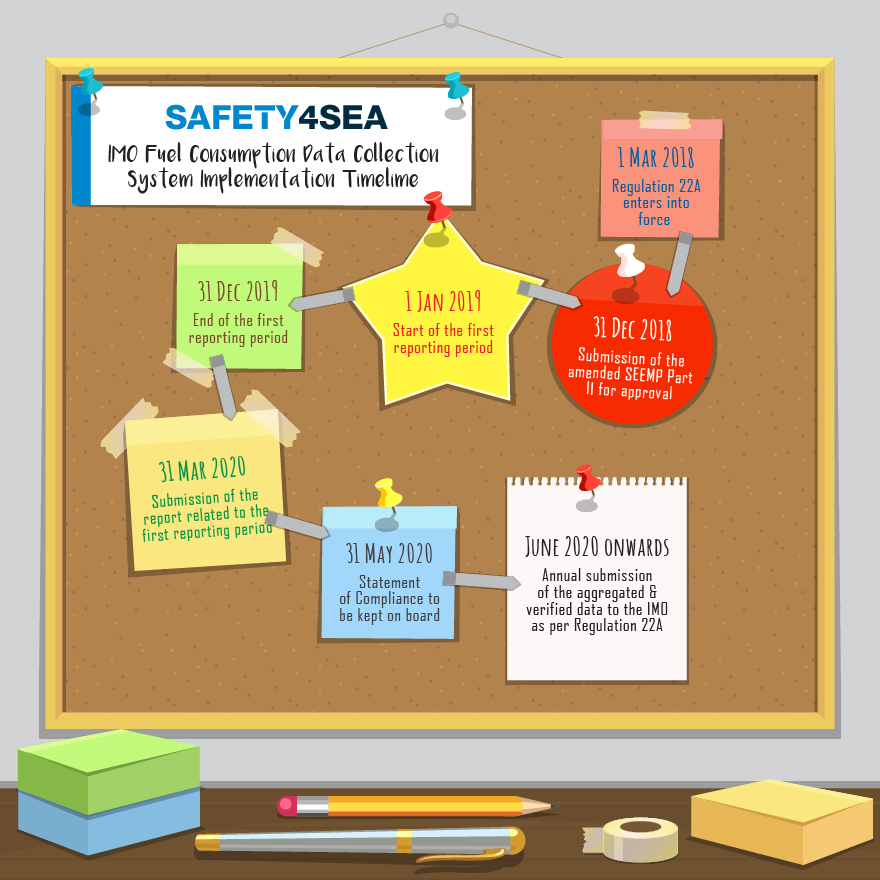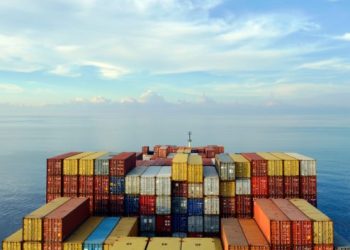The IMO fuel oil consumption data collection system (IMO DCS) became effective on 1 March 2018, requiring from ships of 5,000 gross tonnage and above to submit to their Administration annual reports on fuel oil consumption. In accordance with the latest amendments to Chapter 4 of MARPOL Annex VI, from 1 January 2019, ships must collect fuel oil consumption data based on a methodology that must be included in the Ship Energy Efficiency Management Plan (SEEMP Part II). Namely, all procedures, systems and responsibilities should be outlined in a Data Collection Plan (DCP) included in SEEMP Part II. This would be the first reporting period effective until 31 December 2019.
Implementation process of IMO DCS
In October 2016, MEPC adopted mandatory MARPOL Annex VI requirements for ships to record and report their fuel oil consumption.
In particular, from 1 January 2019, vessels must collect fuel oil consumption data according to a methodology which has to be described and included in the Ship Energy Efficiency Management Plan (SEEMP Part II) by latest 31 December 2018. This should be done according to the 2016 Guidelines for the Development of a Ship Energy Efficiency Management Plan, that Resolution MEPC.282 has adopted.
Following the end of each calendar year, by not later than 31 March of the subsequent year, ships must submit to flag State or RO reports on fuel oil consumption data for the previous calendar year. The report regarding the first reporting period which starts on 1 January 2019, should be submitted by not later than 31 March 2020.
[smlsubform prepend=”GET THE SAFETY4SEA IN YOUR INBOX!” showname=false emailtxt=”” emailholder=”Enter your email address” showsubmit=true submittxt=”Submit” jsthanks=false thankyou=”Thank you for subscribing to our mailing list”]
After the submitted data are verified, classification societies will issue by 31 May 2020 to the ships a Statement of Compliance regarding fuel oil consumption. This should be kept on board for as long as it is valid. The Statement of Compliance shall be valid for the calendar year in which it has been issued and for the first five months of the subsequent calendar year.
The data that underlies the reported data for the previous calendar year must be accessible for not less than 12 months from the end of that calendar year and be made available to this Directorate upon request.
Moreover, ship owners and operators should begin considering the method to collect the fuel oil consumption data. They must also include Part II in their SEEMPs, according to the sample form of ship fuel oil consumption data collection plan included in Appendix 2 of the 2016 Guidelines for the development of a Ship Energy Efficiency Management Plan. The data collection plan should be submitted to the classification societies for approval.
In order to help operators better understand what they must do and when, SAFETY4SEA has created an infographic, describing this process:
Ship Energy Efficiency Management Plan (SEEMP)
As IMO explains, there are two parts to a SEEMP. Part I provides a possible approach for monitoring ship and fleet efficiency performance and options to improve the performance of the ship.
Part II provides the methodologies that ships of 5,000 gross tonnage and above should use to collect the data needed and the processes that the ship should use to report the data to the ship’s Administration or any organization duly authorized by it.
SEEMP I
Planning is very important for part I of the SEEMP, as it determines both the current status of ship energy usage and the expected improvement of ship energy efficiency. For this reason, operators should devote sufficient time to planning so that the most appropriate plan can be developed:
- Ship-specific measures: There are numerous options to enhance efficiency, such as speed optimization, weather routing and hull maintenance. However, the best package of measures for a ship to improve efficiency is different for every ship, depending on its type, cargoes, routes and other factors. These measures should be listed as a package of measures to be implemented, providing the description of actions to be taken.
- Company-specific measures: The improvement of energy efficiency of ship operation may depend on many stakeholders, like ship repair yards, shipowners, operators, charterers or cargo owners. Mainly, such coordination is made by a company rather than by a ship. Subsequently, IMO recommends companies to develop an energy management plan to manage its fleet.
- Human resource development: Raising awareness of and providing training for personnel are also very crucial. Such human resource development should be considered as an important element of planning as well as a critical part of implementation.
- Goal setting: Goal setting is voluntary and aims to create an incentive for proper implementation. The goal can take any form, but it must be measurable and easy to understand.
How to collect fuel oil data (SEEMP II)
Regulation 22.2 of MARPOL Annex VI specifies that:
On or before 31 December 2018, in the case of a ship of 5,000 gross tonnage and above, the SEEMP shall include a description of the methodology that will be used to collect the data required by regulation 22A.1 of this Annex and the processes that will be used to report the data to the ship’s Administration
Part II of the SEEMP, the Ship Fuel Oil Consumption Data Collection Plan contains such methodology and processes.
Fuel oil consumption should include all the fuel oil consumed on. Methods for collecting data on annual fuel oil consumption in metric tonnes include:
- Bunker delivery notes (BDNs): This method determines the annual overall amount of fuel oil used based on BDNs. BDNs must be kept on board for three years after the fuel oil has been delivered. The Data Collection Plan should describe how the ship will operationalize the summation of BDN information and carry out tank readings.
- Flow meters: This method determines the total amount of fuel oil consumption by measuring fuel oil flows on board by using flow meters. In case flow meters break down, manual tank readings or other methods must be performed. The Data Collection Plan should incorporate information about the ship’s flow meters and how the data will be collected and summarized, as well as how necessary tank readings should be conducted.
- Bunker fuel oil tank monitoring on board: Data measured by tank readings are conducted by appropriate methods such as automated systems, soundings and dip tapes. The tank readings should take place daily when the ship is at sea and each time the ship is bunkering or de-bunkering. In addition, the summary of monitoring data with the records of measured fuel oil consumption should be available on board.
- Corrections, such as density, temperature, if applied, should be documented.
Continuing, regarding the information that must be included to the IMO Ship Fuel Oil Consumption Database, this should mention:
- IMO number;
- Period of calendar year covered;
- Technical characteristics of the ship (ship type, gross tonnage, net tonnage, deadweight tonnage, power output of main and auxiliary engines);
- EEDI (if applicable);
- Ice class;
- Fuel oil consumption, by fuel oil type, in metric tonnes and methods used for collecting fuel oil consumption data;
- Distance travelled (over ground), hours underway.
However, despite the fact that only three weeks remain before IMO’s fuel data collection system (DCS) starts, DNV GL reported that many companies have not submitted their SEEMP Part II fuel oil consumption data collection plan for approval.
Classes launch tools to facilitate IMO DCS compliance
In order to ensure compliance with the regulations, classes have started initiatives to help operators. Namely:
ClassNK: Released the ‘ClassNK MRV Portal IMO DCS’. This is a software for reporting, monitoring and verifying shipping CO2 emissions according to the IMO DCS regulations;
DNV GL: Released a reporting and verification online tool. In this, operators can fill in the required information to comply with the regulation;
Bureau Veritas: The app “My Fuel Consumption” uses a digitized process throughout the various steps of IMO-DCS and EU MRV regulations. With the application operators will be able submit their SEEMP online, and download their Confirmation of Compliance.
Differences between IMO DCS and EU MRV
The EU MRV process started in 2017, with ship-owners having to submit their monitoring plan to a verifier for assessment by the end of August 2017.
MRV stands for monitoring, reporting and verification of fuel consumption, CO2 emissions, and transport work of ships. In particular, it is a system to collect and publish for comparison and statistical purposes data on CO2 emissions and efficiency of ships.
It applies to ships exceeding 5000 gross tonnage (GT) regardless of Flag or country of ownership, calling at an EU port from 1 January of 2018 and carrying cargo or passengers for commercial purposes. The accountable entity in the EU MRV is the ship itself. Namely, these ships must:
- Develop their own monitoring plan (MP) and have it assessed by an independent verifier;
- Monitor and report their emissions and activity data, starting on the first of January 2018;
- Have their emissions report independently verified before submission to the Commission and Flag state;
- Carry on-board a Document of Compliance (DOC) from June 2019, which highlights the vessels license to trade and operate.
Both the EU and the IMO have clear ambitions to reduce GHG emissions from ships, and have processes to achieve their goals. Although there are some similarities between the two systems, the more recently outlined IMO approach to monitoring, reporting and verifying carbon emissions (CO2) has some significant differences to the EU MRV legislation.
But, which components are the main differentiators between EU MRV and IMO DCS. The key differences of EU MRV include:
- The EU MRV regulation requires reporting of actual cargo carried onboard, fuel consumed, and CO2 emitted, whereas the IMO only requires reporting of fuel consumed;
- For EU MRV, calculations are made by the shipping companies and verified by an accredited verifier. For IMO, the calculations are verified by the administration, according to national procedures;
- The EU plans to make this information publicly available whereas, for IMO, the raw data will only be available to IMO and flag states who will then share aggregated anonymised data.
The following table provides a comprehensive description of the differences between the two policies:





























































